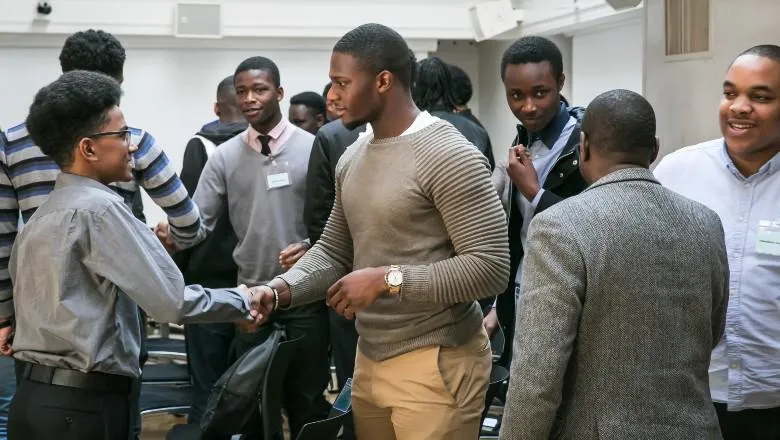I am honoured to be a Diana Award recipient and to have received a special mention from Prince Harry for my work on racial inequality and widening access to education. Princess Diana was fearless and bold in standing up for what she believed in. I believe as individuals we need to embody these qualities and work to make our society more equitable even when it’s uncomfortable and inconvenient. We need to hold the institutions and the systems we exist in accountable for their role in perpetuating a lot of the inequalities that exist.
James Frater, Medical student and Diana Award recipient
02 July 2020
King's medical student receives prestigious Princess Diana Award
James Frater has been recognised for tackling racial inequality and increasing the representation of black students.

James Frater, who is studying on King’s Extended Medical Degree Programme, has received a Diana Award for his work on tackling racial inequality and widening access to university for students from African and Caribbean backgrounds.
The Diana Award is a legacy to Princess Diana's belief that young people have the power to change the world. The charity aims to empower young people to achieve their full potential, engage them in social action and recognise them for their contributions.
The Duke of Sussex gave a surprise congratulatory video message for the virtual 2020 Diana Awards ceremony on Wednesday 1st July, during which he “shared the mic” with James in order to highlight the transformative initiatives he has led to increase the representation of black students in UK universities. You can watch the full video on the Diana Award Instagram account.
Due to his own experience of racial discrimination and inequality, James is determined to make access to education and opportunities more equitable for everyone, regardless of their background. Through his roles at King's as the African & Caribbean Society President, a student ambassador and a Widening Participation intern, James has worked to create spaces for students to feel they belong and ensure that they are represented. James is continuing this important work in his current part-time role as the African and Caribbean Student Lead in the Widening Participation Department.
James has led several key initiatives at King’s, which includes ‘Black Men at King’s College London’ and ‘Queens at King’s’. Both projects aim to increase the representation of black students and showcase their extraordinary achievements. James has also collaborated with other undergraduate students and developed KCLSU-funded projects to enhance young black pupils’ attainment and confidence, such as the Brotherhood Project.
In collaboration with several external organisations, James has helped build partnerships, facilitate the creation of scholarships and develop initiatives to increase the representation of black students. Most notably, James is the Student Lead for the Amos Bursary, a charity which aims to help African and Caribbean boys enter higher education and key positions within the workplace. In this role, James creates content for the charity’s programme to aid the development of students, including how to better support their emotional and mental wellbeing. He also liaises with universities, students and parents in order to provide a more effective and impactful programme.
As a member of the Amos Bursary since 2013, James was instrumental in developing a partnership between the charity and King’s. He continues to organise a two-day conference at King’s each year for over 200 African and Caribbean students, which helps to support them through the process of applying to university. This conference also aims to get parents involved in the UCAS process and to help them understand how serious mental health can be for black students at university. As a result of the relationship facilitated by James, King’s now provide Amos Bursary scholarships to male students of African and Caribbean heritage.
In his current role as the African and Caribbean Student Lead for the Widening Participation Department, James is helping to create a two-year programme specifically for low income African and Caribbean students. This is in line with the King’s Access and Participation Plan target to increase the number of black students at King’s.

James has worked closely with the Widening Participation Department throughout his studies – as a student ambassador, motivational speaker and project lead. Despite a full academic timetable, James generously volunteers his time to inspire young people to fulfil their potential. We are delighted for James and this Diana Award is very well deserved.
Luke Chapman, Head of Widening Participation (Post-16)
James began his own journey at King’s by applying for the Extended Medical Degree Programme (EDMP), which aims to enable students from non-selective state schools with academic potential, who may not have achieved the A-level grades required by conventional medical degree programmes, to study medicine. Set up in 2001, the programme was the forerunner of 20 gateway or foundation medicine programmes now run by UK universities.
The Extended Medical Degree programme at King’s aims to level the educational playing field to allow students from underrepresented backgrounds to study medicine and become doctors. The programme forms a cornerstone of King’s broader commitment to Service, giving back to the community and making the world a better place. Through his work supporting and mentoring students, particularly from black Caribbean backgrounds, James has assisted many aspiring doctors in allowing them to reach their goals and fulfil their potential.
Professor Steve Thompson, Professor of Immunology, Education & Widening Participation. Co-director of the Extended Medical Degree Programme at King's College London
For the important work that he undertakes to tackle racial inequality and increase access to education, James has also been recognised as an outstanding student by Future Leaders, Rare Recruitment, The Association of Jamaican Nationals and the Amos Bursary. Most recently, James received the King’s Future Alumnus Award, which recognised him as a visionary thinker with exceptional potential.
